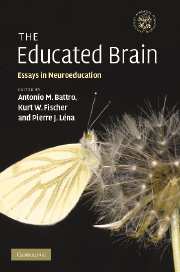Book contents
Foreword: Towards a new pedagogical and didactic approach
Published online by Cambridge University Press: 22 September 2009
Summary
The remarkable scientific developments of these last centuries, and particularly those from the Renaissance until our day, did not always contribute to a substantial change in the educational system, which constantly needs to be updated. In past centuries the total lack of knowledge about the cerebral structures and functions underlying cognitive capacities in the post-natal period has influenced in a negative way the adoption of more pertinent educational practices. In the twentieth century two events of fundamental importance have occurred: the understanding, however incomplete, of the activity of the cerebral organ and most recently the formidable development of computer systems that have imposed a total transformation of individual life in contemporary society.
At the beginning of the third millennium the changes in life styles at a global level require a revision of pedagogical and didactic systems. This radical revision is imperative in education from infancy through puberty and adolescence in order for students to be adequately included in computer science. The individual of tomorrow is the result of the formative attitude of today's child.
Current educational systems are still greatly influenced by the Victorian attitude based upon the principle that the child can be an object of reward or punishment, as is the case with a puppy.
- Type
- Chapter
- Information
- The Educated BrainEssays in Neuroeducation, pp. xxi - xxivPublisher: Cambridge University PressPrint publication year: 2008
References
- 1
- Cited by



